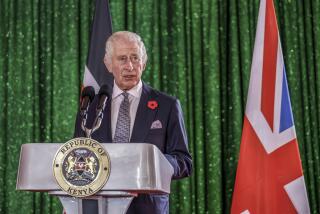A Tale of Two Africas
- Share via
WASHINGTON — Neither Kenya nor Zimbabwe was on President Bush’s Africa itinerary last week. Yet the two countries exemplify the diverging trajectories shaping the continent today.
Kenya experienced a democratic breakthrough with December’s first successful transfer of power after 40 years of one-party rule. Since then, Kenyans have had more reason for optimism than at any time since the early days of independence in the 1960s.
In Zimbabwe, optimism has been displaced by misery. This is almost entirely caused by the increasingly autocratic rule of its leader, Robert Mugabe. In his attempt to cling to the power he’s held for 24 years, Mugabe has driven his once-promising country into the ground.
Since taking office, Kenyan President Mwai Kibaki has moved aggressively to address Kenya’s many pent-up ills. Prime among these is corruption, which had become endemic. According to a United Nations study, corruption cost Kenya’s government about $2 billion in the last decade. Police routinely demanded bribes. The poor were paying up to one-third of their salaries in such “fees.” To kill this cancer, Kibaki appointed a national anti-corruption czar and has launched investigations into previously ignored high-level corruption. Freed from the tyranny of low aspirations, Kenyan society has been correspondingly transformed. Corrupt behavior is no longer tolerated. Citizens refuse to pay bribes and they report errant police officers, even subjecting a few to public humiliation.
Honoring a campaign pledge, Kibaki has committed funds to ensure that all 7 million of Kenya’s school-age children can attend classes. The Ministry of Education now receives the largest single allocation in the federal budget.
On the economic front, Kibaki is trying to refurbish Kenya’s image as an attractive destination for investment. Some taxes have been reduced or eliminated, and state enterprises have been told they can’t count on perpetual subsidies. The new government’s first budget has been praised for balance and discipline. Regulations demanding greater transparency of the financial sector have also been instituted. In response, the World Bank has resumed its normal lending relations with Kenya, which it put on hold in the late 1990s, and the International Monetary Fund is set to do the same.
Kenya still faces serious problems: poor infrastructure, entrenched special interests, weak institutions and porous borders that leave it vulnerable to infiltration by Al Qaeda. But with a more responsive and accountable government in place, these problems are finally being tackled.
Meanwhile, Zimbabwe is spiraling rapidly downward. After stealing an election in 2002, Mugabe has had to resort to ever more extreme measures to stay in power. The winner of the election by most accounts, Morgan Tsvangirai, has been twice jailed and charged with treason. Police and Mugabe supporters have beaten and threatened members of the opposition. A draconian press law has snuffed out independent reporting. In each of the last two years, the economy has contracted by 10%.
Inflation is at 300% annually and rising. In a nation once relatively prosperous, 80% of Zimbabweans are mired in poverty. Traditionally a food exporter, Zimbabwe requires food aid for a majority of its population. In desperation, Mugabe has turned to an old friend, Moammar Kadafi, to restore the supply of oil.
More than a decade ago, when Kenyans and Zimbabweans met, they competitively boasted about how much better their respective countries were. Today, no such rivalry exists. Kenya is emblematic of promising developments around the continent. In Benin, Botswana, Ghana, Mali, Mauritius, Mozambique, Namibia, Nigeria, Senegal and South Africa, democracy in one form or another is taking root. Unfortunately, Mugabe’s old “big man” style of rule remains firmly entrenched in far too many African countries, including Burkina Faso, Cameroon, Central African Republic, Eritrea, Gabon, Gambia, Guinea, Rwanda, Sudan and Togo, to name a handful.
The United States can help the Kibakis of Africa succeed by following through on the pledges Bush made last week: increasing financial and political support to countries governed democratically. Little headway will be made on any of the continent’s major problems -- poverty, conflict, AIDS and famine -- unless there is more open and accountable government. The message to the Mugabes should be: “It’s time for you to go.”
More to Read
Sign up for Essential California
The most important California stories and recommendations in your inbox every morning.
You may occasionally receive promotional content from the Los Angeles Times.













